Search
To search for an exact match, type the word or phrase you want in quotation marks.
A*DESK has been offering since 2002 contents about criticism and contemporary art. A*DESK has become consolidated thanks to all those who have believed in the project, all those who have followed us, debating, participating and collaborating. Many people have collaborated with A*DESK, and continue to do so. Their efforts, knowledge and belief in the project are what make it grow internationally. At A*DESK we have also generated work for over one hundred professionals in culture, from small collaborations with reviews and classes, to more prolonged and intense collaborations.
At A*DESK we believe in the need for free and universal access to culture and knowledge. We want to carry on being independent, remaining open to more ideas and opinions. If you believe in A*DESK, we need your backing to be able to continue. You can now participate in the project by supporting it. You can choose how much you want to contribute to the project.
You can decide how much you want to bring to the project.

Torments of all kinds, torture, auto-da-fés and gallows, have created terrible traditions (…) our rulers have made us barbarians like them, and now they reap the fruits.
Gracchus Babeuf
The world a society builds is, fundamentally, a relationship with time. Similarly, a society is a mode of the appropriation of nature. If we talk about the form of the reproduction of daily life in capitalism, society implies a destructive appropriation of nature, which reifies it and conceives it as a commodity. At the same time, it creates ways of relating to time under a pseudohistorical conception, that is, capitalist time as a semi-cyclical time that has resulted in fragmentary time.[1] For Hito Steyerl, “history seems to have become a loop.” Time passes over itself, what is new in history has apparently disappeared, the possibility of relating to what happened as an … Continue reading
Only a society based on the destruction and commodification of nature, a society which creates an alienated time that separates us from the possibility of being protagonists of our own history, can convert human activity into work. This harmful world uses the exploitation of workers to reproduce capitalist social relationships, thereby making work a harmful activity.
For capital to be able to reduce creative activity to abstract work, that is, for human activity to be reduced to producing merchandise and for individuals to become merchandise themselves, it was necessary to create a mechanized life through the construction of two machines, two transformation processes that allowed the so-called industrial revolution and the bourgeois revolutions to produce a divided society and a commodified world.
One of these machine transformations was based on the construction of regulated time, born in Christian monasteries, which became time measured by means of the clock. This is a sense of time meant to promote a life without spontaneity, a routine existence that avoids indeterminacy and surprise. Clock time became generalized as capitalist society consolidated, creating an increasingly artificial daily life, far removed from the needs and rhythms of nature. This quantitative time is linked to a mechanical order,[2]According to Lewis Mumford, clock time denies history and events, since it is a succession of mathematically isolated instants. to a partially historical sense of time in which everyday life is replaced by equivalent intervals that favor the regularity of a worker’s life and an equally regular and standardized production (Mumford, 2016).
The other machine created was that which transforms the body into a labor machine. This process, more than just the result of an ideological conviction to internalize the idea that work is a good thing, that it brings a collective benefit and that it favors the development of mankind, was a violent imposition designed to break the rebellious body that refused to work (Federici, 2010), giving it only the minimum material conditions needed to survive. This mode of capitalist organization, created by means of torture, punishment and coercion, served the purposes of war and work. Peasants and others had their territories and common lands taken away so that they would have no choice but to sell the only thing they owned, their creative capacity converted into labor power, now just another commodity.
Work is a punishment brought about by the destruction of communities and personal initiative. Life becomes a fragmentary function at the service of an inflexible and dehumanized system (Mumford, 2013). Work is harmful because it means carrying out a series of painful and repetitive actions in order to produce a surplus that is used only for war and for the support of the ruling classes. Thus, the two poles of capital, according to Mumford (2013), are mechanically organized labor and mechanically organized destruction and extermination.
For these reasons, the analysis of work, value and merchandise must recognize the political nature of exploitation, making visible how this, too, is the result of extra-economic violence and domination. In order to reach a point where people have no alternative other than capitalist exploitation to survive, it was necessary to cement the unity between the economic and political powers. Despite the fact that capitalism means the creation of an impersonal power, which among other things favored the separation of the economic and the political, in reality it is the subordination of everything to the market, to the processes of production and accumulation.
Capitalist exploitation, with work as a purely economic singularity (Wood, 2021), can only be sustained from extra-economic power and forms of violence, such as the State, colonialism and organized mafias that guarantee the order and regulation necessary for the reproduction of capital, or chaos and crises created when the reproduction of capital requires it. As capitalism needs to expand spatially and universally, and needs the coercive mechanisms of the State and war, it is not possible to differentiate work from the general development of capital.
Work is the negation of the plurality of creative activities, it is an act that can only produce merchandise. And for merchandise to be produced, an alienated practice prevails in which exploitation is inseparable. Work denies life and imposes survival. The only possibility of positing a different relationship with work is to destroy it. The rejection of work along with the abolition of the alienated world is the path that can help shape a radical critical practice that aims to destroy capital and the State, as well. If these reproduce through work and war, there is nothing left but to propose the denial of work to overcome exploitation and outline a revolutionary practice against a world sustained by the destruction of life and nature, a harmful situation that subsumes creativity and imagination.
Bibliography
Federici, Silvia. Caliban and the Witch. Women, the Body and Primitive Accumulation.
Mumford, Lewis. Myth of the Machine. Technics and Human Development.
Mumford, Lewis. Interpretations and Forecasts.
Steyerl, Hito. Duty Free Art: Art in the Age of Planetary Civil War.
Wood, Ellen M. The Origin of Capitalism. A Longer View.
| ↑1 | For Hito Steyerl, “history seems to have become a loop.” Time passes over itself, what is new in history has apparently disappeared, the possibility of relating to what happened as an experience is diluted and replaced by “a succession of shocks similar to explosions, after which nothing in particular occurred.” |
|---|---|
| ↑2 | According to Lewis Mumford, clock time denies history and events, since it is a succession of mathematically isolated instants. |

Marcelo Sandoval Vargas is a lecturer at the University of Guadalajara (Mexico). He has a degree in History, a master’s degree and a doctorate in Social Sciences from the University of Guadalajara. He has written books La configuración de pensamiento anarquista en México. Horizonte libertario de La Social y el Partido Liberal Mexicano (2011). Guadalajara: Universidad de Guadalajara and Prácticas libertarias y movimientos anticapitalistas. Devenir revolucionario de las colectividades en ruptura (2013). Mexico: Grietas Editores; “Desafíos para pensar el tiempo actual. O cómo incomodarnos de nuestras miserias” (2022) at the University of Guadalajara; Coordinated books: El vuelo del buitre viejo. Guerra por acumulación y nocividad capitalista. Guadalajara: Cátedra Jorge Alonso and La lucha por la vida en las ciudades. Defensa del territorio, irrupciones subterráneas, proyectos de autonomía. Guadalajara: Jorge Alonso Chair. He has participated in projects such as the Centro Social Ruptura, the Revista Verbo Libertario. He is currently editor of the website Asedio.org.
"A desk is a dangerous place from which to watch the world" (John Le Carré)